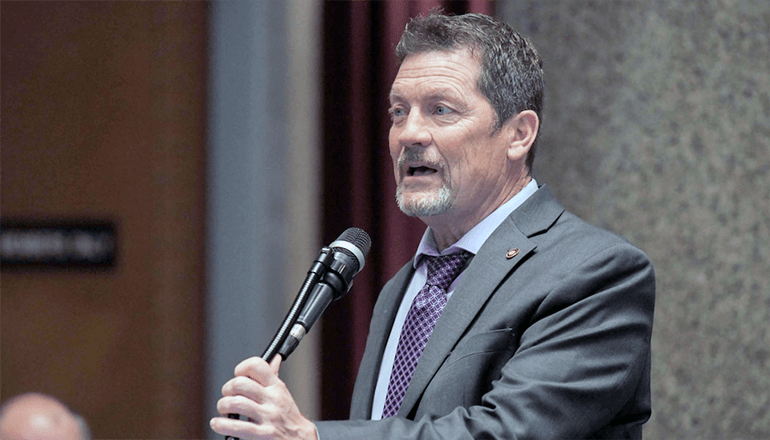(Missouri Independent) – A proposal making it harder to pass constitutional amendments, which one Democrat called “dog poop with icing,” is one step away from a statewide ballot.
On Tuesday morning, the Missouri House voted 107-55 to pass a measure to set the majority needed to pass amendments at 57%. The current threshold is a simple majority and has been since the state was created in 1821.
The measure needs one more vote in the state Senate. If approved, it would be on the November 2024 ballot unless Gov. Mike Parson calls an earlier special election.
During debate, Democrats cited 30-year-old comments from former Gov. John Ashcroft, a Republican, on the sanctity of the initiative process and challenged what has been called “ballot candy” in the measure restating that only citizens can vote in Missouri.
The language, which would be the first item in the ballot description, is icing but when the rest of the product is bad, it doesn’t become a cake, said Rep. David Tyson Smith, D-Columbia.
“You just have dog poop with icing on it,” Smith said.
But Republicans remained united behind Speaker Pro Tem Mike Henderson of Bonne Terre, who argued a higher bar is needed to keep the constitution from being cluttered with lengthy amendments more properly enacted as statutes.
“A simple majority is a good threshold, but not for the Constitution,” Henderson said.
The proposal has been changed from earlier versions by adding provisions that constitutional amendments proposed by legislators must meet the 57% threshold, both at the ballot box and when passing the General Assembly.
When the proposal passed the House, it required a 60% majority but only for amendments proposed by initiative.
The proposal also scrapped an idea added in the Senate that would have allowed constitutional amendments to pass with a 50% statewide majority if it also received a majority in five of the state’s eight congressional districts.
It keeps a version of the new limit on legislative power added in the Senate – initiatives that propose statutory changes cannot be changed for three years after their enactment without a legislative majority of 57% agreeing to the change.
Whether the proposal makes it through the Senate is uncertain because of the changes made in the final version. Sen. Bill Eigel, R-Weldon Spring and a likely candidate for governor, said last week that if the bill came back without the concurrent majority provisions “it would probably run into a lot of trouble in this chamber, especially in the last week.”
On Tuesday morning, Eigel deferred on whether the House-passed proposal is acceptable.
“I have got to give that some thought,” he said. “I have not been thinking about that this morning.”
The ease of changing statutes is one reason many initiatives target the Constitution because a revision can only be made at a subsequent election.
The current state constitution was approved by voters in February 1945 and was just under 27,000 words long. An amendment protecting stem cell research, added by initiative in 2006, was about 2,000 words.
The medical marijuana amendment, another initiative approved in 2018, is almost 8,000 words. Legalizing recreational marijuana in November added 14,000 words in a new section and 2,000 more for revisions to the medical marijuana section.
Medical marijuana was popular because people liked the idea of making it available for veterans and for the money to support veterans programs, Henderson said. Voters were more uncertain about recreational marijuana and it passed with much lower support, he noted.
It would not have passed if the amendment being proposed by Henderson had been in effect.
Most initiatives that have serious efforts to make the ballot are proposed and funded by well-funded interest groups, Henderson said.
“I don’t think the majority of them are grassroots,” he said. “And if you trace the money, much of the money isn’t from Missouri.”
Democrats, however, questioned where the push to restrain the initiative originated. Rep. Joe Adams, D-University City, noted that similar legislation is being considered in several states controlled by Republicans.
The proposals are “mirror images” of very similar language.
“Who is creating that mirror image legislation, then?” Adams asked.
Henderson said the proposal was not influenced from outside the state.
“We came up with this ourselves,” Henderson said.
Democrats said that if Republicans want fewer initiative proposals, the legislative majority should do the things a majority of voters are supporting.
“The reason that people have used it through the past,” Rep. Eric Woods, D-Kansas City said, “is because there is a perception that we are not doing our jobs in this body and across the hall to pass policies the people want.”
(State Rep. Mike Henderson, R-Bonne Terre Photo by Tim Bommel – Missouri House Communications)


